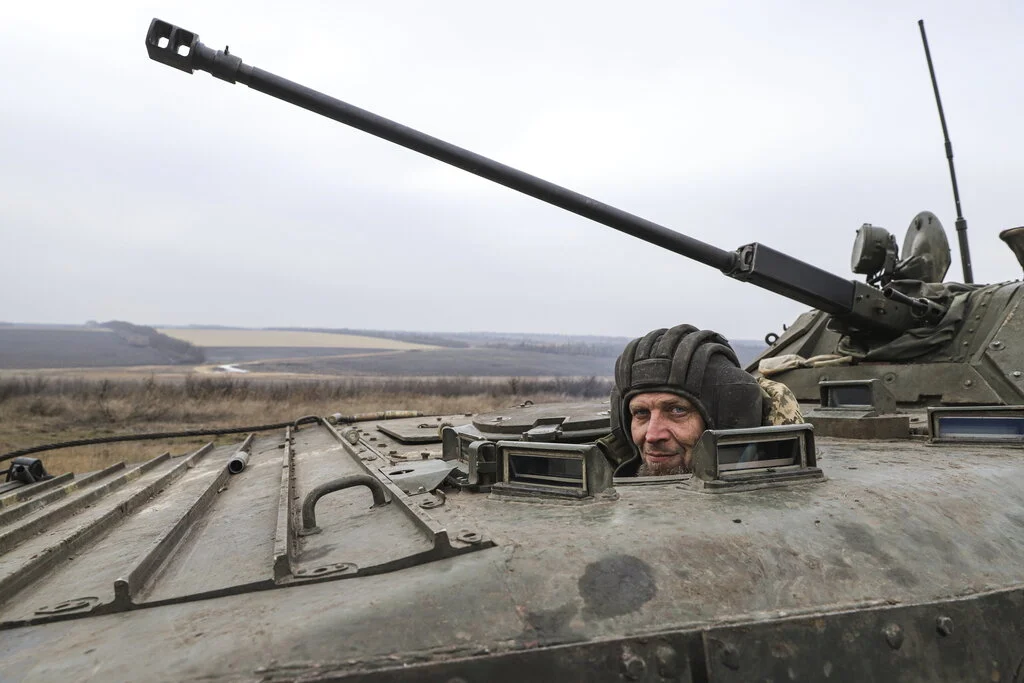PM Orbán: NATO may officially enter the war in Ukraine this spring
Viktor Orbán talked with foreign journalists yesterday in his seat in the Buda Castle. He explained his government’s viewpoint on various topics, including the ongoing war in Ukraine. He said that “we were at war with Russia”.
“We are in great trouble”, PM Orbán said yesterday in the Carmelite Monastery, his seat in the Buda Castle. He added that provided Russia conducts a successful spring offensive, NATO would have to decide whether to enter the war physically. That would mean sending soldiers to die in Ukraine against the Russians. He said the Americans do not think about that, but the number of European leaders concerned with such an option grows.
Therefore, it is not madness to imply that soon NATO soldiers will fight in Ukraine, he said. Orbán did not exclude the use of “tactical” nuclear weapons in Ukraine, rtl.hu wrote. He added history showed the Russian army regularly struggled in the first phase of the war. Afterwards, it becomes unstoppable.
Read also: Misunderstanding? PM Orbán ‘definitely not’ wants Hungary to be an EU member
Foreign minister: Drop war rhetoric, focus on peace
Instead of ratcheting up war rhetoric and risking escalating the conflict in Ukraine, the international community should focus on creating peace, Péter Szijjártó, Hungary’s foreign minister, said on Thursday in New York, adding: “Dialogue is needed as soon as possible.” Szijjártó welcomed the fact that the UN Security Council was holding a meeting and a “timely” debate on how to create and keep the peace, a statement by the foreign ministry said, adding, however, that the minister lamented how “peace is rarely spoken about, and those who do speak about it are criticised and stigmatised”.
Given its close proximity, Hungarians are acutely aware of the war’s effects and severity, he said, noting that one million refugees had departed Ukraine through Hungary. Also, the war and “failed” sanctions have increased the cost of Hungary’s energy imports to 17 billion euros from 7 billion, he added. The minister noted that Hungarians living in Transcarpathia, in western Ukraine, were being conscripted into the Ukrainian army, and many were dying, “sometimes brutally”.
“We Hungarians know all too well why bringing this war to an end is so important,” he said. Besides the untold suffering, European countries must contend with ever higher inflation and an unclear future in terms of its energy supply, so the international community — big and powerful countries in particular — has a big responsibility to ensure that peacemaking is put on the agenda, Szijjártó said. The minister warned against blocking communication channels, adding that this would amount to abandoning the hope for peace.
- Read also: Hungary vetoes aid for Ukraine
Russia’s war in Ukraine war against the common European peace order
Hungary’s foreign minister told journalists in New York on Thursday that Hungarians wanted to stay out of the war in Ukraine. Responding to a passage of a speech made by his German counterpart which referenced the war in Ukraine, Peter Szijjártó said: “Hungary is not at war with anyone.”
In a speech to the Parliamentary Assembly of the Council of Europe, Annalena Baerbock said: “Russia’s war of aggression is not only a war against Ukraine, it is a war against the common European peace order.” In reaction, Szijjártó said: “We are not at war with anyone, we do not want to be at war with anyone … our top priority is the security of Hungary and the Hungarian people.”
The minister added that Hungarian voters in last year’s general election made clear that staying out of the war was their chief aim, and this motivated government’s decision-making and its efforts towards securing peace talks and a ceasefire. Asked about corruption cases in Ukraine, Szijjártó said a key principle of Hungarian foreign policy was “not to meddle in the affairs of other countries”. Szijjártó said that Hungary supported Ukraine’s territorial integrity and sovereignty, and he vowed to continue Hungary’s “largest humanitarian aid operation of all time” as long as it was needed.
Source: MTI, rtl.hu
please make a donation here
Hot news
VIDEOS: Serbian-Hungarian drug trafficking ring busted in Budapest
PHOTOS: Hungary’s newest luxurious Hilton hotel to open soon!
FM Szijjártó: Hungarians in Croatia have again shown force
Forint wakes to a good morning, breaks through crucial levels
Marina City: Development of Budapest’s new Danube-side city quarter begins! – VISUAL PLANS
Austria to extend border control at Hungarian border for 6 more months





5 Comments
Fear mongering. From what he is saying almost daily, it appears that Victor has a lot to loose if Russia is defeated. He is the only leader in the EU that has consistantly beat the drum for all out war, a position that has no basis in reality. He and Putin are little men standing the backs of a propoganda saturated population. WAKE UP the time machine is about to stop in 1956 again.
“In Russian. Without political correctness. First of all, slut-faced, our land is not a no-man’s land, but yours. We have lived here for thousands of years, we did not come from beyond the Urals. On the other hand, you have to be particularly talented in order to travel from Romania and Slovakia to Serbia and They hate people everywhere, even Ukraine. The Treaty of Trianon was only a punishment for your animalistic historical deeds. Thirdly, your cruelties and the constant desire to please the tyrants in every world war have made you a historical pariah. Fourthly, what a baseness to forgive 1956. to the Soviets and their successors? Fifth: you have to be a total moral zero to hide behind the skirts of the EU and NATO and stomp on everyone’s necks. Get out from under the skirts and we’ll wipe you out, garbage, in three days,” wrote Filatov.
“Beasts. No, not the Hungarian people. But those in power there,” added the mayor of Dnipro.
The politician wrote all this after Viktor Orbán called Ukraine a “no man’s land”, in response to which the Ukrainian Foreign Ministry summoned the Hungarian ambassador due to Orbán’s “completely unacceptable” statements on Ukraine.
Does our PM have a crystal ball?
Does he have inside-information?
Is our PM seeing a psychic?
Or, is he just rolling the snowball he started before the elections about war coming to Hungary?
Is he preparing the collective Hungarian psyche for an exit out of NATO (and/or the EU)?
@gaborzsazsa,
Funny to read that insane person Filatov. At first he talks in general about all nation (what about “there is no nazi theories there is Ukraine”), and then he switches to the Government.
And apparently he means Hungarian people, that is obvious out of his speech.
@Mat:
I beg to differ.
Please note Borys Filatov’s open letter to Orbán (on Telegram) starts with “Орбану.
На русском.
Неполиткорректное.” (“To Orban. …”).
I’m Hungarian, and I believe Filatov’s anger is not aimed at all Hungarians (despite some of his sentences not being very clear-minded).
He is fuming at Orbán and his Fidesz led Government.
At any rate, this particular article is not about Filatov’s open letter to Orbán.